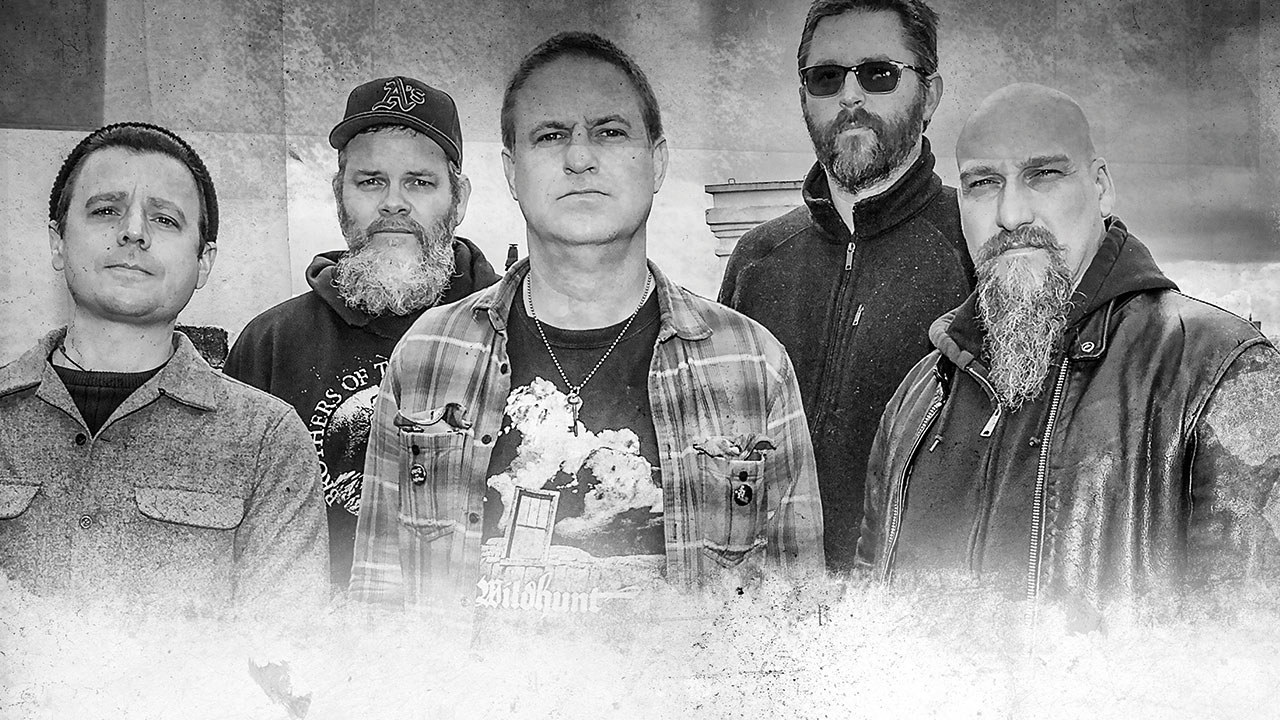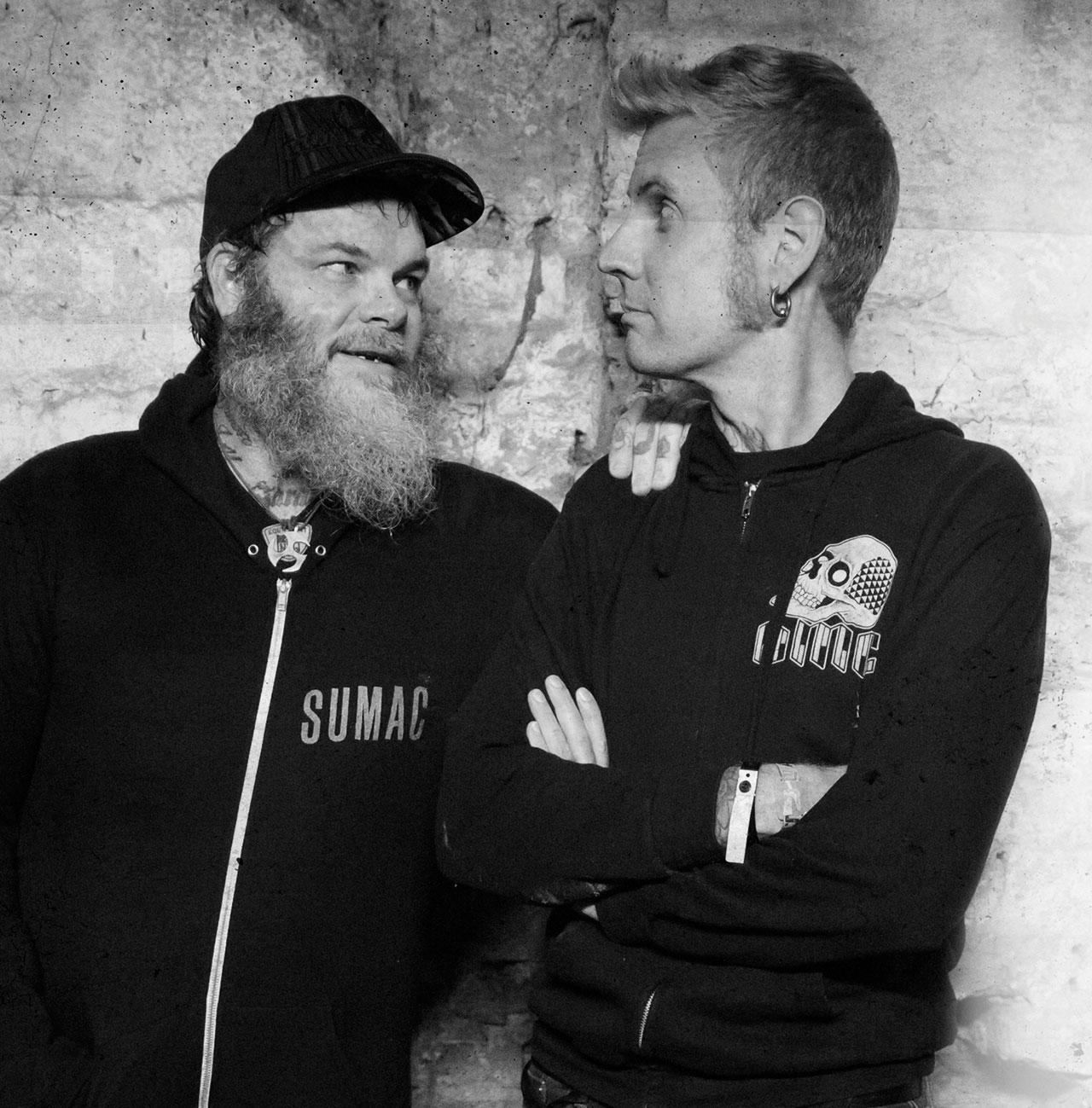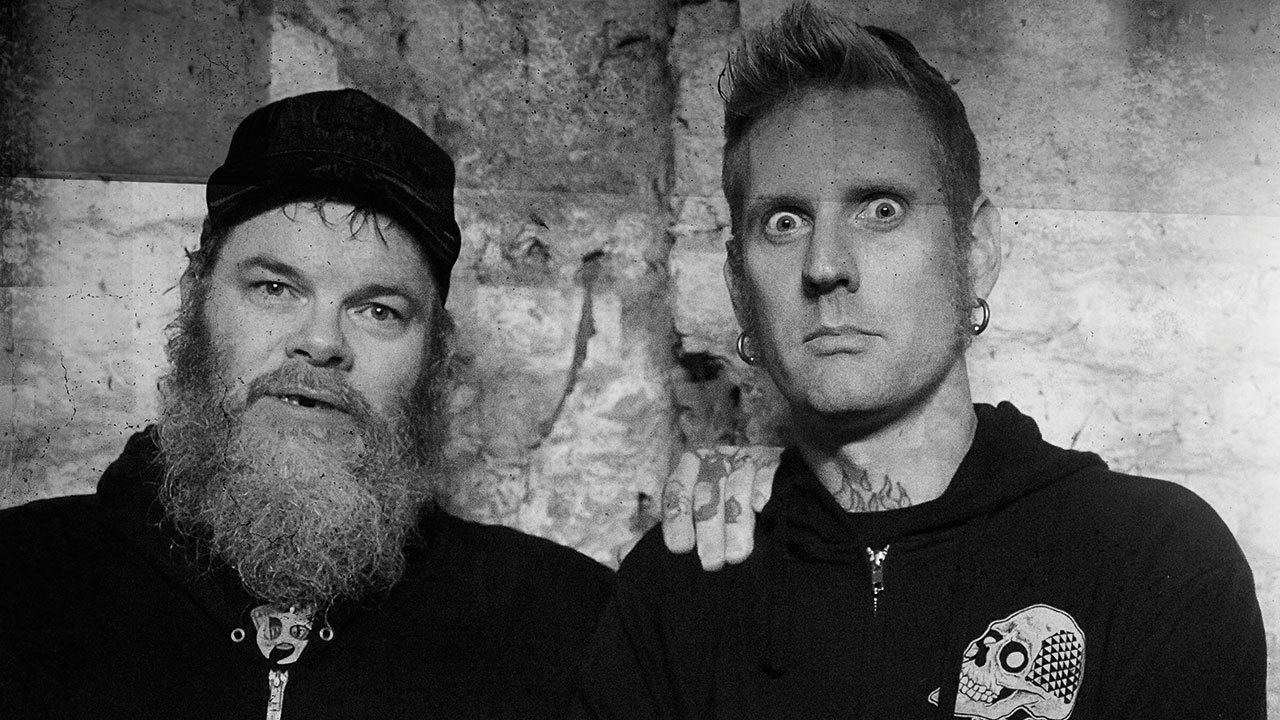The past 30 years have been a long, hard road for Scott Kelly, a struggle articulated in explicit agonies in his diverse solo projects and as co-frontman of underground leviathans Neurosis. One of three founding members in 1985, he has seen the band evolve from their teenage hardcore roots into one of underground metal’s most seminal acts. Their music is an elemental force, their now-rare live shows a bloodletting necessary for their continued survival. It wasn’t until 1992’s visionary Souls At Zero, which saw their tempo reduce drastically amidst nuanced layers of diverse instrumentation, that their legacy began to coalesce. A key band in broadening extreme metal’s palette of influence and expression, they’ve influenced a swathe of artists in their wake even as they retreated from the rigours of touring full time.
The band had an indelible impact on a young Brann Dailor, virtuoso drummer/singer/songwriter of Grammy-winning behemoths Mastodon. Brann first met an already road-hardened Scott while on only his third tour. They stuck a chord instantly and have been like brothers ever since, a 17-year-long friendship rooted in their common experiences of devastating personal tragedy. It is not very often in life you make connections with people as profound as the one they share, and for both, that first tour together marks a watershed moment in their lives. As you’ll soon find out, it was a moment responsible for no less than the very birth of Mastodon.
On the eve therefore of Neurosis’s forth-coming 11th record, Fires Within Fires, a torrid exhalation of existential frustration the likes of which only the process of ageing can provide, who better than Brann for Scott to reflect upon the past 30 years with? Getting them together via conference call makes for an interesting contrast: Scott, sincere and pensive in his responses, versus the sharp wit and energy that is Brann, whose a personality is as lively as his cascading drum fills. It makes for a conversation we feels privileged to be part of.
BRANN DAILOR: “Hey Scott, I heard your album this morning.”
SCOTT KELLY: “Oh yeah? How was that for breakfast?”
BRANN: “I loved it. It made me kinda sad. The first track I thought, ‘Man, that just sounds like illness.’ I always see music cinematically, but it really sounded sick to me. What was your mindset?”
SCOTT: “I don’t know, man, I had a lot to get out… more than usual, which is saying something. It’s been a trying time, and it felt good to do these songs. We’re going to play a couple of them live this summer and see how they feel. Sometimes you write them and they feel one way, but live they either don’t hit the spot, or you go too far and they take you to a place you don’t want to be.”
It’s well known that Brann wrote, at least in part, Mastodon’s 2009 prog masterpiece Crack The Skye to process the tragic suicide of his teenage sister. At this juncture it was impossible not to respectfully inquire as to whether he identified with Scott.
BRANN: “Yeah, of course. There are certain songs that take you to this place, and you don’t regret writing them, you don’t regret going there because you just… had to; but then you go there live every night and you’re like, ‘What the fuck did I do?!’”
Scott agrees, sombrely, before we move on.
BRANN: “Neurosis are the perfect example of a ‘sum of its parts’ kind of group; you thrive off each other’s energy.”
SCOTT: “I agree, man.”
How has that energy changed over the years?
SCOTT: “The intensity level has only increased. I mean, we’re getting together in December to start writing another record. I’m having a crazy prolific thing right now.”
As well as several side-projects, Scott has appeared as a guest vocalist on every Mastodon record since 2004’s Leviathan, and he might have appeared on their first album, had Brann not been scared of asking him…
BRANN: “[Scott] missed the first one because it took me a couple of years to work up the courage to ask! Rejection is a pretty popular fear. So, yeah, Leviathan is the one. We were on tour with Clutch and I got the nerve to ask Neil Fallon [Clutch vocalist] to sing on Blood And Thunder. When he said yes it gave me the confidence to ask you. You said yes, and I was more than elated.”
SCOTT: “So, Neil Fallon’s more important than me?”
BRANN: “That’s not what I’m saying, Scott; he was just the catalyst!”
SCOTT: “Yeah, right!
(Both laugh)
What do Neurosis mean to you personally, Brann? And how did they influence Mastodon?
BRANN: “I had the privilege of touring with them when I was playing drums for Today Is The Day back in 1998-99. We did some light touring in the States and then a full-on European tour. I think it was us, Neurosis and Voivod – so, you know, a pretty good lineup! I was pretty green; probably my third tour. Correct me if I’m wrong, Scott, but I think there were 19 people on one bus?”
SCOTT: “I don’t know, there was a lot of us – one guy with a broken back.”
BRANN: “Oh yeah, that’s right!”
SCOTT: “Eric [Forrest] Voivod’s bass player had broken his back in a van accident. He was fucked-up, but somehow still managing to do the tour. Piggy and Away [Voivod’s late guitarist and drummer, respectively] had to take care of him, change the bandages – he had a big open wound on his back, it was fucked-up!”
BRANN: “And he was still partying and looking for chicks after every show.”
SCOTT: “He absolutely was, heh heh heh! No, it was legitimate, what a tough guy.”

- The Top 10 Best Mastodon Songs
- Mastodon to record new album in coming weeks
- Why Bill Bailey Loves Mastodon
- The A-Z Guide To Mastodon
BRANN: “So in probably May 1991, a buddy gave me a tape that had [Neurosis’s 1985 debut] Pain Of Mind on it. I liked it a lot but it wasn’t until I saw them live that it started to get its hooks in me. Then when we toured together there were some coinciding things happening; it became this very emotional thing. It was a really trying time, but Scott and I became very close. We had had very similar paths in terms of music and family… We’d experienced some similar deaths, and it brought us together. We had a lot to talk about.”
SCOTT: “We sure did, man.”
BRANN: “It really helped, you know?”
SCOTT: “Me, too.”
BRANN: “You know, when you talk about things like suicide, it seems like to me that it’s few and far between that I meet somebody who has gone through a similar situation.”
That must feel incredibly isolating; not many people can emotionally identify with what you’re going through, something that scars you for life.
BRANN: “Yeah. I can get onstage and play my heart out; I can write as many songs about it as I want and it’s still there. So, to have somebody to talk to is important. With suicide there’s this unfortunate guilt that writhes along with it, that eats at you. So, we got on like a house on fire. It was a great thing for me to be able to sink into while things with Today Is The Day were completely falling apart. I found real solace in watching Neurosis crush every night. I’m not religious, but music is my religion and that’s as close as I’ll get. I really was inspired by them. I saw their kinship, the way that they respected each other. They had been touring at that point for maybe 15 years; they were in the grind: the write/record/tour-the-shit-out-of-a-record-and-repeat cycle, which is sometimes a very soul-sucking endeavour, ha ha ha! I was like, ‘Man, what’s it like to be on tour for 15 years. That’s gotta be insane!’ Well, now I know, ha ha ha!
“I just remember Scott being an older brother that I really needed at the time. He was like, ‘Man, fuck all this, you should start your own fuckin’ band.’ Sometimes all you need is somebody to step in and say it’s gonna be OK. I always tried to keep Scott within arm’s reach after the tour; I knew he was going to be a special person in my life.”
It’s difficult not to be touched by such heartfelt sincerity. All of a sudden a relationship that, when viewed from the outside, from the fan’s perspective, could easily be viewed as of purely musical significance gains profound depth.
SCOTT: “It’s way more than art. We cut straight to it, man… somehow we went straight into that really heavy stuff. That was an interesting tour, it was fun; it was a hugely important thing looking back.”
Would it be fair to say that it was the catalyst for the existence of Mastodon?
BRANN: “Yeah, that European tour was absolutely the catalyst for Mastodon, you know, that was absolutely key.”
There you have it. Scott Kelly, responsible in part for not only his own legacy, but that of another legendary band. How it must feel to carry such weight of influence on so many musicians on your shoulders.
SCOTT: “I’m happy that history has taken the course it has. I’m happy that people like our band and respect it – that means a lot – but I don’t think about whether people are influenced by us or not and, in fact, I don’t even hear it. It’s not like Neurosis is some wholly original band; we have really clear influences if you know what you’re listening for.”
Much the same could be said for any band, but the ones that truly set themselves apart, the true pioneers become more than the sum of their influences, developing a unique voice that elevates them beyond the generic.
SCOTT: “I totally agree, but then so much of it has to do with age and maturity. It took us seven years to get to Souls At Zero, and it was a hard fucking seven years, man, but we were committed to getting there in the worst way.”
Age is an interesting aspect. Earlier you said your experiences with Neurosis are only getting more intense as you get older. To what do you attribute that?
SCOTT: “Well, I think music is a reflection of experience, as well as some other things. Fires Within Fires is one of the easiest records we’ve ever written. It wrote itself.”
BRANN: “I liked the decision you made after Times Of Grace. All the touring kinda pulled back. Mastodon are in the [touring/writing/recording] cycle, as you guys were. This is our livelihood, how everyone feeds their families and so on, so there’s a little bit of nagging, like, ‘Hey you’re gonna have to get out there, gotta make some donuts,’ know what I mean? So how do you feel outside of the cycle? Did you feel towards the end that it was affecting the music?”
SCOTT: “That was the number one thing after our families, which we felt were suffering. Being away from the kids, I was literally having terror dreams; I was convinced that we were gonna flip the van or something, but after going through all that, which was somewhat unreasonable and paranoid – which pretty much is me in a nutshell – we felt like the music was going to start suffering; we just couldn’t do it anymore.”

Retiring from touring full time, the band returned to a more settled lifestyle, founding their label Neurot Recordings to not only release their own material, but to host a wealth of underground acts that to this day prevails as one of the scene’s purest wellsprings of inspiration.
SCOTT: “We came up with a plan, starting the label and pulling back, letting things settle. Now simultaneously, the internet happened; I mean it was already there but it really happened. It helped us immeasurably, because there were people with videos of us from back in the 90s, posting them on YouTube. Things started spreading round. Cult status was an unintentional result of our decision to pull back. It’s made a big difference; I hate to make it sound so great. I know the pressure, Brann, have a nice ride, ha ha ha!”
The question begs, Brann: do you feel the cycle adversely affects Mastodon?
BRANN: “I try to be as honest with myself about every single ounce of music that comes out, but also try to keep everybody else happy in the band. When you got people going this way and that way, and we…”
SCOTT: “And that’s just one guy!”
We can only guess that Scott is possibly referring to the well-documented misadventures of a certain Mastodon guitarist/vocalist…
BRANN: “Yeah, ha ha ha! Scott knows more than anybody that you can’t go on tour for 17 years without doing insurmountable damage to the people you love. I can’t even tell you the damage done by this dream you have when you’re a teenager. It’s a tough juxtaposition, but I need this music so much. I have to tell the people that I love, ‘Trust me, you’re not gonna want to be around me if I don’t have it!’, but I don’t feel that the music is suffering because I don’t put anything out that I’m not in love with. The grind isn’t easy, though. We’ve slowed down a bit and I think we will continue to; it’s the smart thing to do. Neurosis is always a beacon; a good reminder of how to conduct yourself. Scott, I love you so much!”
SCOTT: “Ha ha ha! I love you too, brother.”
BRANN: “I love Neurosis, I love your new record. You’re a dear friend and I really appreciate you and all the advice you’ve given me over the years. I can’t wait to see you again!”
SCOTT: “Me too! I gotta go, guys; I gotta get ready for work.”
And there it is, the dull thud of reality striking as a metal legend 30 years in the making gets ready to go do his day job. It’s a moment that serves to remind us how financially unsupportive a beast the modern music industry can be, but also that musical legacies, genuine ones, are worth much more than money. They’re worth respect, and lifetime friendships. After 30 years, times might still get tough, but Scott Kelly and Neurosis have found their balance.
